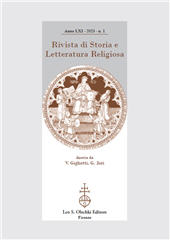«In Britany the Waldenses Doctrine Was Quickly Received by Many» : il ricorso all'antichità dei valdesi nell'Inghilterra del Sei-Settecento
P. 109-141
Nell'Inghilterra del XVII secolo, l'interesse nei confronti dei valdesi medievali si collocava in un quadro di aspettative politiche, attese religiose e ipotesi di ricostruzione storica del passato nazionale. Il contributo esamina un campione di opere di autori britannici che durante il Seicento fecero ricorso alle vicende e al patrimonio teologico dei valdesi medievali per cercarvi i predecessori della Chiesa d'Inghilterra, alle prese con la necessità di dimostrarne la continuità storico-dottrinale e far fronte alle divisioni interne e allo scontro con la Chiesa di Roma. I valdesi non solo erano riconosciuti quali antenati delle Chiese scaturite dalla Riforma del XVI secolo, ma assunsero un interesse crescente nel momento in cui le fonti utilizzate dagli ecclesiastici eruditi (calvinisti, puritani, battisti) sembravano poter soddisfare la sete di “prove” storiche di una (presunta) precoce presenza valdese sul suolo britannico, già a partire dalla fine del XII secolo.
In questo processo, una tappa fondamentale fu l'immediata e fortunata diffusione in traduzione inglese dell'Histoire des vaudois del pastore ugonotto Jean-Paul Perrin. La possibilità di vantare una “radice valdese” per la Chiesa d'Inghilterra seduceva non soltanto intellettuali di primo piano, impegnati nella controversia con Roma, ma divenne patrimonio comune e si dimostrò una preziosa risorsa anche per quegli ecclesiastici che, nelle loro parrocchie e vicariati, sentivano l'urgenza di legittimare il messaggio della propria predicazione. [Testo dell'editore]
In seventeenth-century England, interest in the medieval Waldenses was set within a framework of political and religious expectations and theories of historical reconstruction of the national past. The contribution examines a sample of works by British authors who, during the 17th century, made use of the events and theological heritage of the medieval Waldenses to search for predecessors to the Church of England, faced with the need to demonstrate its historical-doctrinal continuity and to deal with internal divisions and the clash with the Church of Rome. The Waldenses were not only perceived as the ancestors of the Churches arose from the Reformation in the 16th century, but also became increasingly interesting at a time when the sources used by learned ecclesiastics (Calvinists, Puritans, Baptists) seemed to be able to satisfy the need for historical ‘evidence' of an (allegedly) early Waldensian presence on British soil, starting as early as the end of the 12th century.
A true milestone in this process was the immediate and successful dissemination in English translation of the Histoire des vaudois by the Huguenot pastor Jean-Paul Perrin. The possibility of claiming a ‘Waldensian root' for the Church of England seduced not only leading intellectuals, engaged in the controversy with Rome, but became a common heritage and proved to be a precious resource also for those clergymen who, in their parishes and vicariates, felt the urgency to legitimise the message of their preaching. [Publisher's text]
112412 characters
-
Articles from the same issue (available individually)
-
Information
DOI: 10.82026/11712
ISSN: 2035-7583


